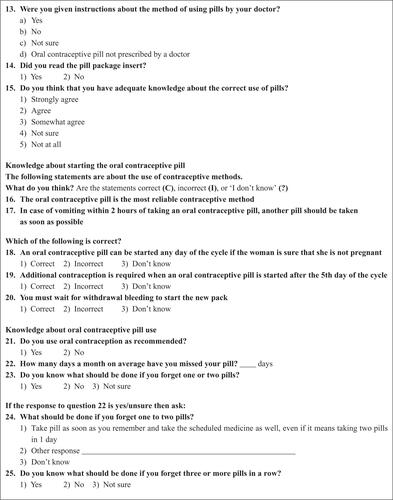Abstract
Background
Oral contraceptive pills (OCPs) are one of the most reliable methods of contraception. However, lack of knowledge about oral contraceptive use and inconsistent pill-taking might result in decreased efficacy. The study reported here aimed to explore women’s knowledge about oral contraceptive use and assess the factors associated with knowledge about OCPs among users.
Methods
This cross-sectional survey was conducted at King Abdulaziz University Hospital, Jeddah, Saudi Arabia between April and June 2014. We included married, non-pregnant women >18 years old who had used a combined 21-day OCP for at least 3 months prior to recruitment. A questionnaire was used to collect the participants’ demographic information. It also assessed their knowledge about OCPs. Data were entered into and analyzed using SPSS software.
Results
A total of 357 women were recruited. Of these, 57.7% reported they knew what to do after missing one or two pills, but only 18.3% knew exactly what to do after missing more than two pills consecutively. Postgraduate women had a significantly higher knowledge score than illiterate women (P=0.002) and those who had completed at least primary education (P=0.001). Conversely, there was no difference in knowledge scores between Saudi and expatriate women (P=0.2). Monthly incomes (P=0.2) and mode of OCP selection (P=0.2) were also not significantly associated with knowledge scores.
Conclusion
Women had poor knowledge about OCP use. Appropriate measures should be taken to educate women about proper oral contraceptive use.
Acknowledgments
The authors would like to thank the medical students Dr Sarah Binmahfooz, Dr Zainab Alsadeq, Dr Sajeda Alsadah, Dr Deema Tashkandi, Dr Hanin Ayoub, Dr Nada Bashri, Dr Rawan Zatari, Dr Maram Ainalden, and Dr Alaa Albrakati for their efforts in helping with data collection. The authors would also like to acknowledege medical students Dr Majid Bahaa Abaalkhail and Dr Yousef Bahaa Abaalkhail for their help in data entry.
Disclosure
The authors declare no conflicts of interest in this work.



